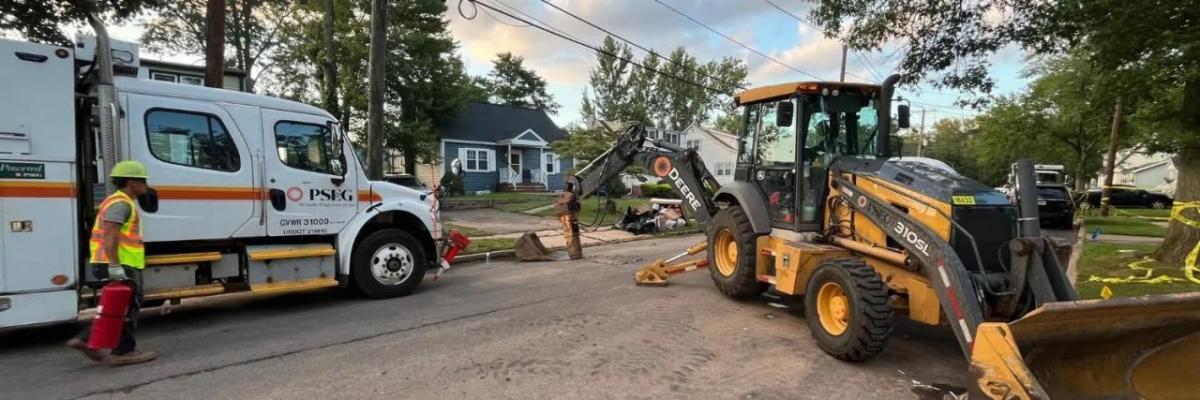When Waters Rise: How PSEG Responds To Flooding And Protects Public Safety
In mid-July 2025, a powerful storm system swept through central New Jersey, unleashing more than five inches of rain in just four hours. The deluge triggered widespread flash flooding, resulting in submerged basements, stranded vehicles, damaged homes and havoc across the community.
Flash floods are not only impactful to the public but can potentially damage gas infrastructure as well. Whether it's the fallen tree whose roots pulled up a gas service line, or the flooded home whose meter and appliances were submerged, weather effects can be unpredictable and impactful to utility services.
On blue-sky days or state of emergency weather conditions, we are committed to ensuring the safety of the public, employees, the community and utility infrastructure, and we stand ready to support and respond at all times.
From flames to floods: Acting swiftly in the storm's aftermath
On the same stormy night, we mobilized quickly, shutting off gas service to flood-affected areas and assessing preliminary flood damage to homes and gas appliances. Technicians from across the state joined forces to ensure a swift and coordinated response, visiting over 600 homes to conduct field assessments and responding to several reports of gas leaks, customer outages and compromised structures – including a house fire in North Plainfield believed to be linked to the flooding.
To help accelerate restoration, we deployed pallets of meters and materials to a mobile incident command site in the heart of the impacted communities.
In cases where flood waters had receded and equipment was considered safe to turn back on, crews reconnected service to more than 200 homes over a four-day period. In other cases, technicians installed new meters for customers whose equipment was affected by flood damage. For customers who experienced more extensive flood damage and could not be restored immediately, our teams provided guidance on next steps to ensure safe reconnection and remained available for reconnection appointments once those steps had been completed.
Hidden dangers beneath flash flood waters
Flash floods differ from traditional flooding in one critical way: speed and volume. They're triggered by intense, short bursts of rainfall that overwhelm drainage systems and leave you little time to plan or react.
But flooding isn't just about what you can see. Rising waters can infiltrate systems like gas meters, boilers, furnaces, water heaters and electrical equipment – posing serious risks such as gas leaks, fires and even explosions. Submerged appliances may suffer internal damage that isn't immediately apparent, creating hazardous conditions long after the waters recede.
“Safety is always our top value. When it comes to natural gas, unseen damage can be dangerous,” said Brian.“We ask all customers to act quickly if they smell gas and to immediately exit the building and move at least 350 feet away. Once you are at a safe distance, call us at 1-800-880-PSEG (7734) or call 911. If you believe your boiler or water heater may be overheating or was under water, contact us and we will inspect your appliances for free.”
What you need to know about flood-damaged gas equipment
Flood-damaged appliances are not just unusable – they're dangerous. Water can corrode internal components, potentially leading to electrical hazards, carbon monoxide leaks and other health risks. We do not restore service to gas appliances exposed to flood waters until they have been professionally inspected, repaired if necessary and deemed safe.
Here's what to do if your appliances or gas equipment have been under water.
-
Do not use any flooded or damaged appliance until inspected.
In the event a gas appliance fails inspection, we will tag it and disconnect it from the gas service to ensure your safety and that it is not a risk to your home or community. Prior to it being reconnected, you will need to repair or replace the appliance so it can operate safely.
If electrical equipment such as the electrical panel or meter box is damaged, a licensed contractor must make the repairs and pass a municipal inspection.
Once repairs are complete, call us at 1-800-350-7734 to schedule an appointment for appliance reconnection.
We are committed to customers
Extreme weather is unpredictable, but our commitment to safety and reliability for our customers never wavers. We understand the toll these events can take on you, which is why we prepare year-round to minimize any disruption and work tirelessly to restore service safely and efficiently, should disruptions occur.
“We are proud to be your energy provider, and we will continue to be there before, during and after the next storm,” said Brian.

Legal Disclaimer:
MENAFN provides the
information “as is” without warranty of any kind. We do not accept
any responsibility or liability for the accuracy, content, images,
videos, licenses, completeness, legality, or reliability of the information
contained in this article. If you have any complaints or copyright
issues related to this article, kindly contact the provider above.
Most popular stories
Market Research

- New Cryptocurrency Mutuum Finance (MUTM) Raises $15.8M As Phase 6 Reaches 40%
- Bydfi Joins Korea Blockchain Week 2025 (KBW2025): Deepening Web3 Engagement
- Yield Basis Nears Mainnet Launch As Curve DAO Votes On Crvusd Proposal
- 0G Labs Launches Aristotle Mainnet With Largest Day-One Ecosystem For Decentralized AI
- Ethereum-Based Defi Crypto Mutuum Finance (MUTM) Raises Over $16 Million With More Than 720M Tokens Sold
- Fintech's Gender Gap In Focus: Drofa Comms' Women Leading The Way Joins Evolvh3r's She Connects At TOKEN2049






















Comments
No comment